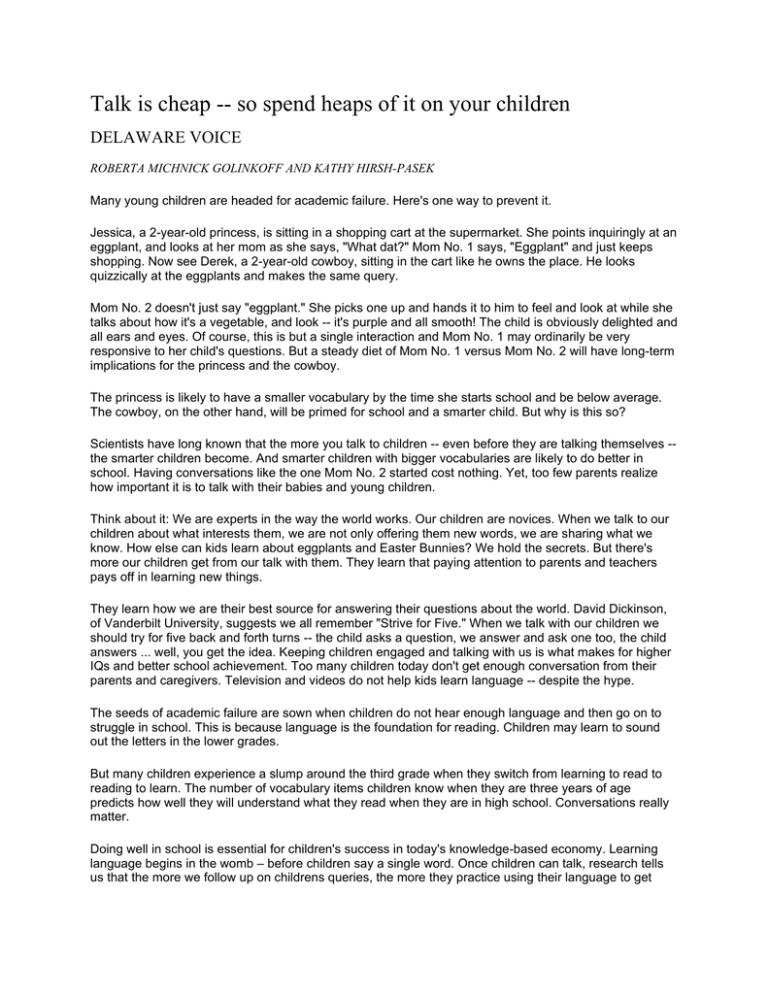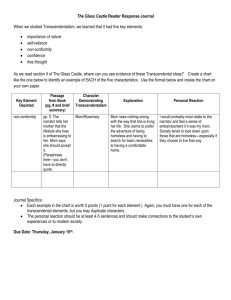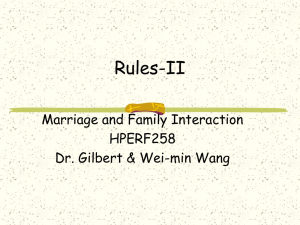Talk is cheap -- so spend heaps of it on... DELAWARE VOICE
advertisement

Talk is cheap -- so spend heaps of it on your children DELAWARE VOICE ROBERTA MICHNICK GOLINKOFF AND KATHY HIRSH-PASEK Many young children are headed for academic failure. Here's one way to prevent it. Jessica, a 2-year-old princess, is sitting in a shopping cart at the supermarket. She points inquiringly at an eggplant, and looks at her mom as she says, "What dat?" Mom No. 1 says, "Eggplant" and just keeps shopping. Now see Derek, a 2-year-old cowboy, sitting in the cart like he owns the place. He looks quizzically at the eggplants and makes the same query. Mom No. 2 doesn't just say "eggplant." She picks one up and hands it to him to feel and look at while she talks about how it's a vegetable, and look -- it's purple and all smooth! The child is obviously delighted and all ears and eyes. Of course, this is but a single interaction and Mom No. 1 may ordinarily be very responsive to her child's questions. But a steady diet of Mom No. 1 versus Mom No. 2 will have long-term implications for the princess and the cowboy. The princess is likely to have a smaller vocabulary by the time she starts school and be below average. The cowboy, on the other hand, will be primed for school and a smarter child. But why is this so? Scientists have long known that the more you talk to children -- even before they are talking themselves -the smarter children become. And smarter children with bigger vocabularies are likely to do better in school. Having conversations like the one Mom No. 2 started cost nothing. Yet, too few parents realize how important it is to talk with their babies and young children. Think about it: We are experts in the way the world works. Our children are novices. When we talk to our children about what interests them, we are not only offering them new words, we are sharing what we know. How else can kids learn about eggplants and Easter Bunnies? We hold the secrets. But there's more our children get from our talk with them. They learn that paying attention to parents and teachers pays off in learning new things. They learn how we are their best source for answering their questions about the world. David Dickinson, of Vanderbilt University, suggests we all remember "Strive for Five." When we talk with our children we should try for five back and forth turns -- the child asks a question, we answer and ask one too, the child answers ... well, you get the idea. Keeping children engaged and talking with us is what makes for higher IQs and better school achievement. Too many children today don't get enough conversation from their parents and caregivers. Television and videos do not help kids learn language -- despite the hype. The seeds of academic failure are sown when children do not hear enough language and then go on to struggle in school. This is because language is the foundation for reading. Children may learn to sound out the letters in the lower grades. But many children experience a slump around the third grade when they switch from learning to read to reading to learn. The number of vocabulary items children know when they are three years of age predicts how well they will understand what they read when they are in high school. Conversations really matter. Doing well in school is essential for children's success in today's knowledge-based economy. Learning language begins in the womb – before children say a single word. Once children can talk, research tells us that the more we follow up on childrens queries, the more they practice using their language to get information -- just like in school. Practice in understanding what people are saying -- even as a baby -means that children will understand their teachers and not get lost as the class moves on. Hearing lots of language and talking about the pictures and words in storybooks is what builds good readers, not memorizing the names of the letters of the alphabet. Talk is cheap -- except if you are a young child trying to learn how to talk yourself. Then it's priceless!






